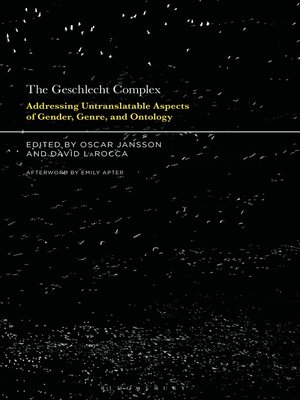The Geschlecht Complex
ebook ∣ Addressing Untranslatable Aspects of Gender, Genre, and Ontology
By Oscar Jansson

Sign up to save your library
With an OverDrive account, you can save your favorite libraries for at-a-glance information about availability. Find out more about OverDrive accounts.
Find this title in Libby, the library reading app by OverDrive.



Search for a digital library with this title
Title found at these libraries:
| Loading... |
The polysemous German word Geschlecht — denoting gender, genre, kind, kinship, species, race, and somehow also more — exemplifies the most pertinent questions of the translational, transdisciplinary, transhistorical, and transnational structures of the contemporary humanities: What happens when texts, objects, practices, and concepts are transferred or displaced from one language, tradition, temporality, or form to another? What is readily transposed, what resists relocation, and what precipitate emerges as distorted or new?
Drawing on Barbara Cassin's transformative remarks on untranslatability, and the activity of "philosophizing in languages," scholars contributing to The Geschlecht Complex examine these and other durable queries concerning the ontological powers of naming, and do so in the light of recent artistic practices, theoretical innovations, and philosophical incitements. Combining detailed case studies of concrete "category problems" in literature, philosophy, media, cinema, politics, painting, theatre, and the performing arts with a range of indispensable excerpts from canonical texts — by notable, field-defining thinkers such as Apter, Cassin, Cavell, Derrida, Irigaray, Malabou, and Nancy, among others — the volume presents "the Geschlecht complex" as a condition to become aware of, and in turn, to companionably underwrite any interpretive endeavor.
Historically grounded, yet attuned to the particularities of the present, the Geschlecht complex becomes an invaluable mode for thinking and theorizing while ensconced in the urgent immediacy of pressing concerns, and poised for the inevitable complexities of categorial naming and genre discernment that await in the so often inscrutable, translation-resistant twenty-first century.
Drawing on Barbara Cassin's transformative remarks on untranslatability, and the activity of "philosophizing in languages," scholars contributing to The Geschlecht Complex examine these and other durable queries concerning the ontological powers of naming, and do so in the light of recent artistic practices, theoretical innovations, and philosophical incitements. Combining detailed case studies of concrete "category problems" in literature, philosophy, media, cinema, politics, painting, theatre, and the performing arts with a range of indispensable excerpts from canonical texts — by notable, field-defining thinkers such as Apter, Cassin, Cavell, Derrida, Irigaray, Malabou, and Nancy, among others — the volume presents "the Geschlecht complex" as a condition to become aware of, and in turn, to companionably underwrite any interpretive endeavor.
Historically grounded, yet attuned to the particularities of the present, the Geschlecht complex becomes an invaluable mode for thinking and theorizing while ensconced in the urgent immediacy of pressing concerns, and poised for the inevitable complexities of categorial naming and genre discernment that await in the so often inscrutable, translation-resistant twenty-first century.






